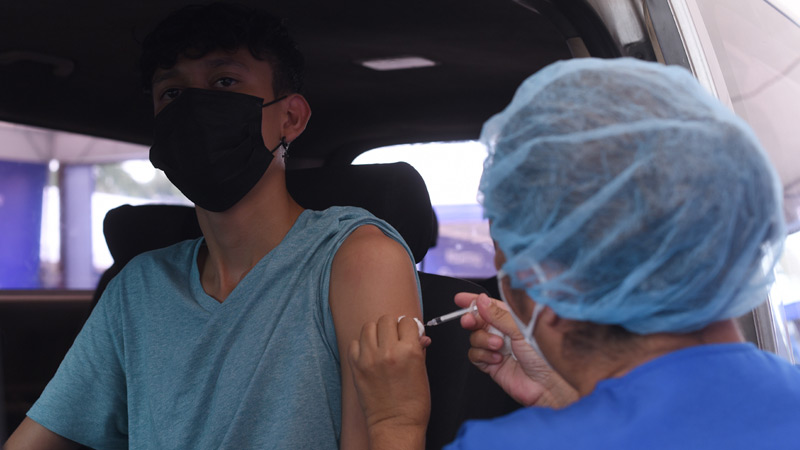The specialist recommends that the Ministry of Health strengthen communication so that people receive reinforcements against the virus, especially those over 50 and with a risk profile.
As an infectious disease specialist and student of the behavior of the covid-19 pandemic, Dr. Alfonso Rosales offered his assessments of the current situation in the country, especially in light of the increase in deaths from the disease in recent weeks.
Furthermore, he explained that it is important to double the communication from the Government so that the general population, but especially those over 50 or with risk factors, come to receive reinforcements from the anticovid vaccine.
According to data from the Minsal, deaths from covid-19 in the country have had the following behavior in the last three months: in October only one person died; 15 men and 21 women died throughout November; In December, in the first week, 8 men and 4 women died of covid. What do you think?
READ ALSO: Fourteen people died of covid in El Salvador in the first week of December
This is a significant increase in mortality, which is consistent with a significant increase in cases. Most likely, a significant number of these cases are elderly and vaccinated. To avoid this high mortality, it would be important to include early antivirals, Paxlovid and Remdesivir (within the first 5 days of symptoms) in elderly patients with multiple risk factors.
Does this mean that more vaccinated people die?
In countries reporting new waves and with high vaccination coverage, most deaths are vaccinated but older adults and with multiple risk factors.
But, then, are the vaccines already received by the population still effective?
The vaccine protects against serious illness and death, but this protection is seen to be greatest with the fourth dose. El Salvador has low reinforcement coverage. The other factor is time. Reinforcements are also being seen to decrease their protection after six months.
Doctor, in this regard, in other countries there is talk of an “updated” vaccine, which is made according to new subvariants that have emerged. Are these vaccines the ones being applied now in El Salvador?
also: Health confirms that there are already 31 deaths from Covid-19 in November alone
The new vaccine is the “bivalent” because it has two components, one of the original virus and another specific to the Omicron variant. It has slightly higher protection, but the original PfiZer and Moderna vaccines still offer substantial protection (60%) against serious illness and death, so boosters with these vaccines are still recommended.
Which Central American countries are already introducing this bivalent vaccine?
In Central America, only Costa Rica.
If boosters decrease your protection in 6 months, how can you motivate the population to get vaccinated? The third and fourth dose numbers are very low in the country. For example, only 1,871,701 third doses applied (according to the latest Minsal epidemiological bulletin, for the week of November 20-26, 2022).
Exactly. This is precisely where El Salvador should be most aggressive in its campaign to promote strengthening, especially among the population most vulnerable to serious disease. Otherwise, each wave will be accompanied by a high mortality rate.
If in the country only 1,871,701 have received a third dose, how to interpret that data, in terms of risk for the population?
The population over the age of 50 and those of any age with multiple risk factors, and without booster vaccinations, will have a high hospitalization and death rate with each new wave of covid. Of those 1.8 million Salvadorans with a booster vaccine, we don’t know what percentage are over 50 or what percentage have multiple risk factors.
For those who are not in these conditions, both by age and by risk factor, what danger can they get repeatedly ill with covid, whether they are two, three or more times?
Also: Doctors point out that the government has outdated and not very credible information on covid
In general, in the population under 50 and without risk factors, the disease is mild. The new variants that are appearing are more contagious but less virulent.
So, is there no risk of contracting the disease again, on multiple occasions?
People with the most infections but under 50 and without risk factors have not been seen to have high mortality. They usually have mild disease.
What do you think of a return to wearing a mask? Would it be convenient, and in which places or situations?
It is convenient as an “individual” decision in people over 50, with pathologies considered at high risk and above all when they are in a closed place with a large number of people.
In other countries, especially in Europe and some in Latin America, the use of the mask is already quite limited, within the parameters you explain, as a recommendation only for that population at risk.
Exactly. It is not recommended to impose protective measures if the health system is not under pressure or in crisis. Education and promotion of these measures is recommended, thus protecting the economy and education in the countries.
In the case of El Salvador and the Ministry of Health’s efforts in that direction, what do you think?
Transparent information should be strengthened, as well as the promotion of vaccination, especially in the elderly.
The Minister of Health, Francisco Alabí, recently said that the application of annual reinforcements of the anti-covid vaccine, as is done with the flu, is being studied at an international level. Is that where we’re headed? Would it be widespread or only for the aforementioned at-risk population?
With current evidence, we are heading towards the inclusion of the annual covid vaccine. It would be for the general population, but with an emphasis on the elderly.


